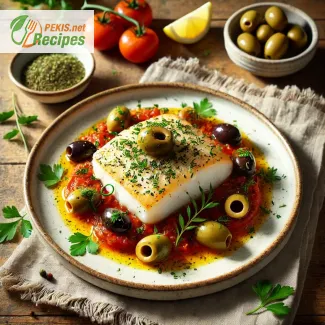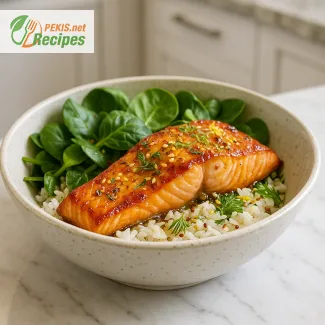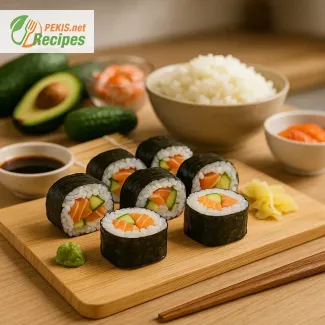
A dish that effortlessly bridges simplicity and sophistication, White Cod with Olives offers a captivating taste of the Mediterranean. Imagine a beautifully tender fillet of white cod, gently seared to achieve a delicate golden crust while preserving its moist, flaky interior. This premium fish, with its subtly sweet flavor, pairs harmoniously with a medley of olives, which add a savory depth and a hint of brininess. The olives, a mix of green and black varieties, provide contrasting textures and nuances, elevating the cod's clean taste with their earthy, slightly tangy notes.
The dish is further enhanced by a silky olive oil-based sauce, infused with garlic, fresh herbs like thyme and rosemary, and a splash of white wine for an extra layer of refinement. The aromatic sauce ties the flavors together, infusing the cod with subtle herbaceousness and a delicate citrus undertone. Plated elegantly, this meal invites you to savor each bite—a combination of tender fish, the mild saltiness of olives, and the smooth richness of a perfectly emulsified sauce.
White Cod with Olives is not just a meal; it’s a culinary experience that evokes the feeling of dining al fresco on a sun-kissed terrace overlooking the azure waters of the Mediterranean. Each bite transports you to a place where simplicity meets elegance, celebrating the balance of fresh, quality ingredients. Perfect for both a light, elegant dinner or a special occasion, this dish captures the essence of coastal cuisine in its most refined form.
- Preparation of the Cod Fillets: Pat the cod fillets dry with a paper towel, then season both sides generously with salt and pepper. Set aside while preparing the sauce.
- Sauté the Aromatics: Heat 2 tablespoons of olive oil in a large skillet over medium heat. Add the chopped red onion and sauté until softened, about 3 minutes. Add the minced garlic and cook for another minute until fragrant, being careful not to burn it.
- Add the Olives and Capers: Stir in the pitted olives (both green and black) and the capers. Cook for 2-3 minutes, allowing the olives to heat through and release their flavors.
- Deglaze with White Wine: Pour in the white wine and bring the mixture to a simmer. Let the wine reduce by half, about 4-5 minutes, allowing the alcohol to evaporate and the flavors to concentrate. Add the lemon juice and zest to brighten the sauce.
- Cook the Cod: In a separate skillet, heat the remaining 2 tablespoons of olive oil over medium-high heat. Place the seasoned cod fillets in the skillet and cook for about 4-5 minutes on each side, depending on the thickness of the fillets. The cod should be opaque and flake easily when done.
- Combine and Simmer: Once the cod is cooked, transfer it to the skillet with the olive and wine sauce. Lower the heat and let the cod simmer in the sauce for about 2-3 minutes, allowing the flavors to meld together. Add the fresh thyme sprigs during this step.
- Serve: Carefully transfer the cod fillets to individual plates. Spoon the olive and caper sauce over each fillet. Garnish with freshly chopped parsley and a drizzle of olive oil. Serve with your choice of side, such as roasted potatoes or a light salad.
Nutritional Impact of "White Cod with Olives" on Health
Cod Fillets (White Cod):
- High-quality protein: Cod is a lean source of protein, containing around 30g per serving. Protein is essential for muscle repair, immune function, and enzyme production. It provides the building blocks (amino acids) needed for tissue growth and maintenance.
- Low in fat: White cod is naturally low in fat, especially saturated fat, making it a heart-healthy option. Low-fat diets are often recommended to reduce the risk of cardiovascular diseases. However, cod still provides small amounts of beneficial omega-3 fatty acids, known for their anti-inflammatory and heart-protective properties.
- Rich in vitamins and minerals: Cod is an excellent source of B vitamins, particularly B12, which supports nerve health and red blood cell production. It also provides phosphorus and selenium—important for bone health and immune function.
Olives (Green and Black):
- Heart-healthy fats: Olives are rich in monounsaturated fats, especially oleic acid, which is linked to reducing inflammation and improving heart health. Monounsaturated fats can help lower LDL (bad cholesterol) while raising HDL (good cholesterol), thereby promoting a healthier lipid profile.
- Antioxidants: Both green and black olives contain antioxidants like vitamin E and polyphenols, which help protect cells from oxidative stress and reduce the risk of chronic diseases like cancer and heart disease.
- Rich in sodium: Olives are naturally salty due to their brining process, contributing to a higher sodium content. While sodium is necessary for nerve and muscle function, excessive intake can increase blood pressure, especially in those sensitive to salt. Moderation is key.
Garlic:
- Cardiovascular benefits: Garlic contains compounds like allicin, known for their heart-protective effects. It can help reduce blood pressure and cholesterol levels, and its anti-inflammatory properties support overall cardiovascular health.
- Immune booster: Garlic has long been associated with strengthening the immune system due to its antibacterial, antiviral, and antifungal properties.
Onions:
- Antioxidants and fiber: Onions are a rich source of antioxidants, particularly quercetin, which has anti-inflammatory and anti-cancer properties. They also provide fiber, supporting digestive health and reducing the risk of gastrointestinal issues like constipation and irritable bowel syndrome (IBS).
- Blood sugar control: Onions have compounds that can help regulate blood sugar levels, making them beneficial for individuals with diabetes or those looking to maintain steady glucose levels.
Olive Oil:
- Monounsaturated fats: Olive oil, especially extra virgin olive oil, is another excellent source of heart-healthy monounsaturated fats. These fats have been linked to improved cholesterol levels and reduced risk of heart disease.
- Anti-inflammatory properties: Olive oil contains powerful antioxidants like polyphenols, which reduce inflammation throughout the body and lower the risk of chronic diseases such as cancer, arthritis, and Alzheimer's disease.
Lemon Juice:
- Vitamin C boost: Lemons are an excellent source of vitamin C, which plays a critical role in supporting the immune system, protecting skin from oxidative damage, and aiding in the absorption of iron from plant-based foods.
- Alkalizing effect: Although acidic in taste, lemon juice has an alkalizing effect once metabolized in the body, helping to balance pH levels and promote overall digestive health.
Capers:
- Rich in antioxidants: Capers contain flavonoids, including quercetin and rutin, which are known for their anti-inflammatory and antioxidant properties. These compounds can help protect cells from oxidative damage, reducing the risk of chronic diseases.
- Low-calorie flavor enhancer: Capers add a tangy, salty flavor to dishes without significantly increasing caloric intake, making them a great way to enhance flavor without adding extra fat or sugar.
Thyme:
- Anti-inflammatory and antimicrobial: Thyme contains thymol, a compound with strong antimicrobial and anti-inflammatory properties. It supports respiratory health and can help reduce inflammation in the body.
- Rich in vitamins: Thyme provides small amounts of vitamins like vitamin C and A, contributing to overall immune function and skin health.
Wine (or fish stock):
- Moderation is key: In this recipe, dry white wine is used to add depth of flavor and enhance the dish's richness. Alcohol, when used in cooking, generally evaporates, leaving behind flavors without significant alcohol content. In moderation, wine can provide antioxidants like resveratrol, which is known for its heart-protective effects.
Parsley:
- Rich in vitamins: Parsley is packed with vitamin C, K, and A, making it a small but powerful addition to any dish. Vitamin K is essential for blood clotting and bone health, while vitamin A supports vision and skin health.
- Detoxifying effect: Parsley is known for its detoxifying properties, helping to flush out excess fluids and reduce bloating, thanks to its diuretic effects.
Overall Health Impact:
This dish is a great example of a balanced meal that provides lean protein, heart-healthy fats, and a variety of vitamins and minerals. The combination of cod and olives promotes cardiovascular health through the reduction of bad cholesterol and the inclusion of anti-inflammatory compounds. Antioxidants from olives, garlic, onions, and parsley further protect against oxidative stress, contributing to a lower risk of chronic diseases. The moderate use of capers and olives requires attention due to their sodium content, but this can be balanced by reducing additional salt in the recipe. The presence of healthy fats helps absorb fat-soluble vitamins (like A and K), while the lemon juice aids digestion and provides a refreshing contrast to the richness of the fish and olives.
This meal supports heart health, boosts immunity, and provides essential nutrients without excessive calories, making it a wholesome and delicious option for a balanced diet.
Including a dish like "White Cod with Olives" in your regular meal plan can be highly beneficial due to its balance of lean protein, healthy fats, and nutrient-dense ingredients. Ideally, a meal like this could be enjoyed once or twice a week as part of a well-rounded diet. Fish, particularly white cod, provides essential nutrients like omega-3 fatty acids and lean protein, which are important for heart health, brain function, and muscle maintenance. The Mediterranean-inspired combination of olives, olive oil, and fresh herbs further supports cardiovascular health through their anti-inflammatory and antioxidant properties.
General advice:
- Variety in protein: While this dish is a great source of lean protein, it's important to vary your protein intake. Consider rotating between different types of fish, lean poultry, and plant-based proteins like legumes and tofu to maintain a diverse diet.
- Watch the sodium content: Because olives and capers are naturally high in sodium, it’s a good idea to monitor your salt intake when preparing this dish. You can reduce added salt in other meals to maintain a balanced sodium intake for the day.
- Pairing with sides: For a complete, balanced meal, pair this dish with fiber-rich sides like quinoa, brown rice, or a simple green salad to increase your intake of complex carbohydrates and dietary fiber.
- Sustainable fish sourcing: When purchasing cod, look for sustainably sourced options. Overfishing can deplete fish stocks, so choosing certified sustainable options helps support healthier ecosystems.
Incorporating "White Cod with Olives" into your weekly meal rotation can help you maintain a healthy diet while enjoying a flavorful and satisfying dish that aligns with the principles of heart-healthy Mediterranean cuisine.





